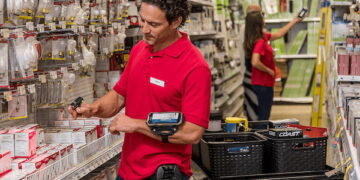Crédito: fuente
Many of the most popular stocks on the Robinhood trading platform are indisputably risky. Beleaguered airlines and cruise lines. Speculative biotechs. Shaky energy companies. They’re not the kinds of stocks you can buy and rest easy.
This isn’t true of all of the stocks on Robinhood’s top 100 most popular list, though. Several are anything but beleaguered, speculative, and shaky. Here are three Robinhood stocks that are so solid that you can buy and hold them practically forever.
Image source: Getty Images.
1. Alphabet
Few companies claim as strong of a moat against competition as Alphabet (NASDAQ:GOOG) (NASDAQ:GOOGL). Just ask Microsoft (NASDAQ:MSFT). The software giant spent a boatload of money to battle Alphabet’s Google search engine, launching Bing in 2009. And Google still dominates internet search with a market share of around 86% — only 4% less than it held a decade ago.
Last year, advertising on Google Search, YouTube, and other Google properties generated revenue of $113.3 billion, constituting nearly 70% of Alphabet’s total revenue. Granted, Alphabet posted its first year-over-year revenue decline in the second quarter as the COVID-19 outbreak negatively impacted corporate advertising budgets. However, even amid a global pandemic, Alphabet still made a profit of close to $7 billion on sales of $38.3 billion. That’s not bad at all for a temporary disruption.
Alphabet has plenty of other long-term growth drivers. Its Google Cloud unit delivered 43% year-over-year sales growth in Q2. The company’s Google Play app store and YouTube subscriptions helped boost Google’s non-advertising revenue by nearly 26%.
Over the longer term, Alphabet will be an even bigger winner if some of its other investments pay off. The most important unit to watch is self-driving car technology business Waymo. Don’t overlook Alphabet’s bets on healthcare, though, with its Calico and Verily subsidiaries.
2. Amazon
Amazon (NASDAQ:AMZN) ranks as another giant tech stock that’s a great buy-and-hold pick. The e-commerce leader also commands a strong competitive advantage that it continues to expand.
The COVID-19 pandemic has boosted Amazon’s business. In fact, CFO Brian Olsavsky acknowledged in the company’s Q2 update that Amazon has more demand than it can handle. Consumers turned to online shopping like never before while shelter-in-place orders were in effect. Expect the e-commerce trend to stick around.
Amazon’s biggest source of profit growth is its Amazon Web Services cloud hosting unit. AWS operating income soared 58% year over year in Q2, with revenue jumping 29%. Although rivals like Google and Microsoft are capturing additional market share, AWS continues to be an impressive growth engine for Amazon.
The company isn’t resting on its laurels. Amazon has taken important early steps to expand into other areas. Notably, it acquired online pharmacy PillPack in 2018. Don’t be surprised if Amazon uses PillPack as a launching pad to broaden its healthcare presence, possibly including telehealth.
3. PayPal Holdings
PayPal Holdings (NASDAQ:PYPL) stands out as a big winner from the shift to e-commerce. The company provides a technology platform for digital and mobile payments used by merchants and consumers across the world.
Like Amazon, PayPal continues to benefit from the coronavirus outbreak. Its revenue jumped 22% year-over-year in the second quarter. The company expects to add 70 million net new active customers this year — at least twice as many as it has added annually in recent years.
Will the use of digital payments fall off once the pandemic is over? Almost certainly not. PayPal CEO Dan Schulman stated in the company’s Q2 conference call, «In the midst of the COVID pandemic, we have seen substantial macro changes that we believe will have a lasting and profoundly positive impact on our business.»
PayPal’s Venmo peer-to-peer payment app should continue to enjoy strong momentum as consumers shift away from cash and checks to digital payments. The company’s launch of QR codes for use with its PayPal or Venmo apps also allows the company to profit from consumer shopping at brick-and-mortar retail locations. PayPal, like both Alphabet and Amazon, looks like a Robinhood favorite whose popularity just might be permanent.








